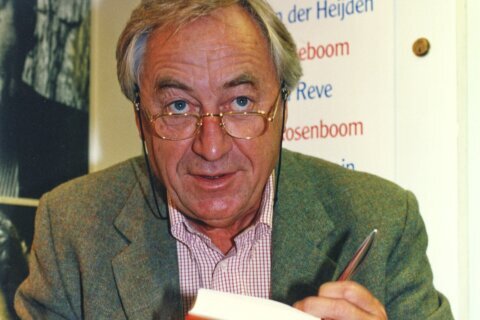Hear our full chat on my podcast “Beyond the Fame with Jason Fraley.”
Today’s generation knows “Aqualung” from Will Ferrell’s hilarious flute parody in “Anchorman” (2004). However, Jethro Tull frontman Ian Anderson has his own thoughts on such zany pop-culture references.
“I don’t think it’s necessarily only Jethro Tull that he was lampooning,” Anderson told WTOP. “I think there was a strong connection to my friend, a Washington resident [who] became the press secretary for George W. Bush, Tony Snow … he was a jazz flute player, that’s how we got to know each other. The Ron Burgundy character was a TV anchorman and Tony Snow was a radio anchorman … I think it’s modeled on Tony with a little bit of Jethro Tull.”
Either way, all generations are invited to Jethro Tull’s “Seven Decades Tour” at Wolf Trap in Virginia on Aug. 24.
“We have released an album or some music in each of those seven decades,” Anderson said. “That’s not to suggest that it’s been a full 70 years that Jethro Tull has been active in the sphere, because in fact it’s only a mere 55 years since we started, but it spans the end of [the 1960s] and now the 2020s, the relative beginning of another decade, so ‘Seven Decades’ is technically correct, but it’s not 70 years.”
Born in Dunfermline, Scotland in 1947, Anderson’s family moved to Blackpool, England when in 1959 where he studied at the Blackpool College of Art from 1964 to 1966. He formed Jethro Tull in 1968, naming the band after the British agriculturalist and inventor of the seed drill. The original lineup included Mick Abrahams on lead guitar, Glenn Cornick on bass guitar, Clive Bunker on drums and of course Anderson on lead vocals and flute.
“The flute I had picked up and played for the first time only in December, just before Christmas of 1967, so I did my learning on stage playing the clubs and pubs, including the famous Marquee Club in London,” Anderson said. “At that point, there weren’t too many people playing the flute, as you can imagine, so it was something of a novelty and it became probably the reason we got noticed by the music press to begin with.”
Indeed, the progressive-rock flute helped the band stand out from other rock bands at the time.
“It didn’t so any harm to be playing an unusual instrument,” Anderson said. “Ray Thomas of The Moody Blues played flute and tambourine. Chris Wood of Traffic played saxophone and flute. A few people have tried to bring the flute into the world of progressive rock since, but the prominent nature of the flute in Jethro Tull is more akin to the electric guitar. It’s the lead instrument playing riffs and solos. It’s really in your face. You can’t escape it.”
Before crossing the pond, Jethro Tull had several early British hits, including “Love Story” and “Sweet Dream.”
“I think a departure point was ‘Love Story,’ which we recorded in late Oct. 1968,” Anderson said. “It was the last song that Mick Abrahams played on. He wasn’t very keen on the direction that I was taking in terms of writing new music. That’s his last appearance in the recording studio and the beginning of Jethro Tull doing something that wasn’t really just the blues. It was more of a hybrid, embracing influences from other kinds of music.”
Abrahams was replaced by Martin Barre on lead guitar for albums like “Stand Up” (1969) and “Benefit” (1970).
“With Martin Barre joining the band, we took on a more interesting set of musical influences and a musical style that cemented our position in the early days in the UK, but we toured in the USA in 1969. We did three tours and it was slow, but we began to make a bit of an impact. We were fortunate to play on some shows supporting Led Zeppelin, who were already quite established as a major new act, so that got us a bit of an audience.”
Their fourth album, “Aqualung” (1971), went triple platinum as the title track became a global smash. The lyrics provided a serious social commentary based on a photo of a homeless man sitting on a park bench in London.
“I looked at some photographs my first wife had taken and said, ‘Let’s use this for the basis of a song,'” Anderson said. “I came up with a title, she wrote some lyrics and we fleshed out the character, talking about who this person might have been … the riff was something I possibly already had. I know I was on the tour in the U.S. when I came up with the [riff] … those notes could have been the clarion call of the opening of a Beethoven symphony.”
The same album also featured “Hymn 43,” exploring the misuse of Jesus Christ’s teachings by modern-day evangelicals, and “Locomotive Breath,” exploring the theme of overpopulation to the chugging rhythm of a train.
“The world is full of songs expressing personal feelings,” Anderson said. “I am more of an objective songwriter. I like to observe things and present them in a way that is interesting to me, the band and ultimately the audience … there are others like Bruce Springsteen, what he writes musically is like a social documentary on places he knows and people he grew up with. I find that more interesting than the endless talking about myself.”
In 1972, the band re-released “Living in the Past,” which he wrote in an hour at a hotel room in Boston.
“A manager wanted a song that we could record and send back to the UK to be released — because we were in the USA for 13 weeks on that first tour — in order to not lose the interest of the British audience,” Anderson said. “To humor him, I went up to my room and said, ‘I’ll be back in an hour with a song,’ and I was. It was a fun thing to record a couple days later in New York with a small orchestra, then I did the vocals and flute in San Francisco.”
After two more chart-topping albums with “Thick as a Brick” (1972) and “A Passion Play” (1973), Anderson wrote “Bungle in the Jungle” for the album “War Child” (1974), referencing the animal kingdom as analogies for humans. For the record, the song arrive on Oct. 14, 1974 before the famous “Rumble in the Jungle” boxing match between Muhammad Ali and George Foreman on Oct. 30, 1974, so you could say Jethro Tull influenced boxing lore.
“It was the refinement of a song that wasn’t a very good song that we’d actually worked on a year before in France but didn’t really come up with an album project of sufficient quality,” Anderson said. “One of the songs … was called ‘The Law of the Bungle,’ and that lead to ‘Bungle in the Jungle,’ likening human society and characters in the real world to being the animals of a cruel, bitter jungle society where the big guys eat the little guys.”
Diehard fans of Jethro Tull will each have their own favorite projects as the band has released nearly two dozen albums in seven different decades. Most recently, they released their 23rd album in April called “RökFlöte” (2023).
“I had a working title of ‘Rock Flute,’ because I told the record company that it would be a rock album … and it would prominently feature the flute,” Anderson said. “By the end of the day, I decided on the general theme of the album and it became ‘Rök,’ the old Icelandic word for destiny, and ‘Flöte,’ the Germany word for the instrument that I play, both sporting a not merely decorative umlaut as employed by Motörhead or Mötley Crüe.”
Despite the band’s legacy, he doesn’t think they should enter the Rock & Roll Hall of Fame.
“I don’t think Jethro Tull really belongs in what is an American institution,” Anderson said. “Most of the Brits in the Hall of Fame are people who owe a huge amount to American music in terms of their style or way of performing. They are embracing America in the way they produce musically, while Jethro Tull since 1968 has not really owed a great deal to American music. We’ve tended to follow a different path, so I don’t think we really qualify.”
Hear our full chat on my podcast “Beyond the Fame with Jason Fraley.”








